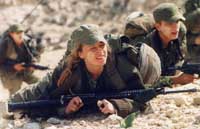Thousands prepare for major civil defense exercise in Israel
Air raid sirens blared on Tuesday and thousands of security and emergency personnel simulated an array of unconventional and rocket attacks to demonstrate lessons learned from last summer's much-criticized war with Lebanese guerrillas.

In the course of the two-day drill, police, soldiers and rescue crews were to respond to simulated assaults on seven different locations, including a chemical attack on a school and a rocket strike on a Tel Aviv power station.
In an unexpected twist, the exercise was briefly suspended after security forces alerted that a real attack might be underway on a major highway near Tel Aviv. Police stopped one car on the road and arrested three passengers, police spokesman Micky Rosenfeld said. Bomb disposal experts searched the vehicle for explosive devices, but turned up nothing in their initial inspection, Rosenfeld said.
He had no details on the identity of the arrested men, but Israel Radio said Palestinians from the West Bank town of Jenin and an Israeli Arab were taken into custody.
At the school in Ramat Gan, near Tel Aviv, the crack of dummy stun grenades split the air as a soldier, in the role of a guard, fell to the ground, red paint gushing from his shirt. Yellowish smoke, meant to simulate chemicals, wafted around the basketball court in the schoolyard, and soldiers pretending to be wounded people lay on the ground, wailing, "I can't see," and "My eyes."
"We are demonstrating through such an exercise the lessons we learned in the past war," Maj. Gen. Yitzhak Gershon, the chief of Israel's Home Front Command, told reporters ahead of the drill. The operation is meant to improve coordination among the various security forces and rescue crews, Rosenfeld said.
Critics have said the army and home front command did not do enough to protect northern Israel from the nearly 4,000 rockets that Hezbollah guerrillas rained on the area during the war.
A total of 159 Israelis were killed during the monthlong conflict, including 39 civilians hit by Hezbollah rockets, despite a heavy Israeli onslaught on the militia. A U.N.-brokered truce took hold Aug. 14.
Next month, a government-appointed commission is to issue interim findings on authorities' actions during the war.
The sirens sounded only in central Israel. There were fears they would spark panic in the north, because the border is still tense following the war. No sirens were heard in the south, either, where alarms frequently mark the firing of Palestinian rockets from nearby Gaza, reports AP.
A total of 5,000 police, or 25 percent of the overall operational force, and 6,000 soldiers were to take part in the drill, security officials said. About 130 communities will be involved in the operation, Rosenfeld said.
Subscribe to Pravda.Ru Telegram channel, Facebook, RSS!





